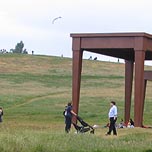We are developing the social individualist meta-context for the future. From the very serious to the extremely frivolous... lets see what is on the mind of the Samizdata people.
Samizdata, derived from Samizdat /n. - a system of clandestine publication of banned literature in the USSR [Russ.,= self-publishing house]
|
Harry Hutton and his commenters very quickly became fed up with people going on about the British Stiff Upper Lip, and the Spirit of the Blitz. I know the feeling, and I am sure they speak for many. A lot of this talk is indeed rather self-conscious and theatrical, by which I mean not arm waving and emoting, but just a case of us all deliberately summoning up our inner David Nivens so that the bits of us just above our mouths will look suitably stiff in TV close-up.
Plus, I wonder how stiff our upper lips would now be if three thousand people had died and London had lost two of its most striking buildings.
On the other hand, the father and mother of Philip Russell, the second person on this melancholy list, were briefly on the telly this afternoon. She was silent. He was a model of considered sorrow. There was no out-of-control display of rage, no “why us?” wailing, just calm grief, and quiet words of appreciation for the character of their departed son. If Mr Russell senior is shedding tears he was not showing it to the cameras, and we were spared those hideous, triumphant close-ups of a person showing more feelings to the camera-persons than he intended. To dismiss Mr Russell’s reaction as mere theatricality would be very tasteless, and I would say, mistaken.
But whether you think all this talk of stiff upper lips is a media led posture or the real thing or, as I think, a bit of both, the good news is that it all makes a most refreshing change from the emotional incontinence that greeted the death of Diana Princess of Wales. This, we all immediately realised, is the real thing. Quite enough real people have lost real loved ones whom they actually knew and really liked, without lots of other people piling in with self-indulgent displays of bogus misery concerning people they never knew.
There is also the fact that, whereas the message that all those silly public mourners were sending out when Princess Di died was all about what the Horrid Paparazzi had done, and of What She Meant To Us, blah blah blah, we now all understand that the more we emote about these bombings, the more pleased will the people be who did them, and who helped them, and who are now cheering that they did them. We do not want to give those people any further satisfaction. So yes, it is all a bit theatrical, in the sense that the tone is deliberate. But, good.
Tony Blair, instinctive politician that he is, tuned in to both moods. When Di died, he was on the verge of tears. When these bombs went off, he had already practised a much calmer display, to suit the new, far more serious – far more real – state of affairs.
Emotional continence is not the same as intellectual excellence. A stiff upper lip is no excuse for refusing to use the brain a few inches above it in an intelligent manner. I am not saying that everything Tony Blair and his supporting caste of cabinet ministers and coppers has been correct, just that the tone of voice has mostly been good. What we ought to think – and what we ought to do – is a quite distinct matter from how we should merely feel about all this. (I strongly agree with Johnathan Pearce that last Sunday’s Telegraph leader is an excellent place to start. And if you liked that, you will also like this by Mark Steyn.)
But, with all those caveats duly caveated (or whatever it is you do with caveats), emotional continence is entirely the right emotional atmosphere within which to get stuck into the process of sharpening up our thinking about all these matters, and then acting upon those thoughts. It is, in short, an excellent start.
I have just been watching Panorama, on the subject of Islamic terrorism, and according to an investigator in Morocco, Al Qaeda has a new dress code. To start with, you must wear a beard and robes. You only switch to ordinary western clothes, to blend in, when you switch to “active service”.
This reminds me of a snatch of dialogue I recall from the movie Ice Station Zebra, which went approximately as follows. (I only saw it a long time ago, so what follows may be somewhat approximate.)
Patrick McGoohan (yes – The Prisoner himself) plays a secret service agent, and he is asked what he thinks of one of the people on the expedition, or at the base, or whatever.
“Yes” says the McGoohan character, “we’ve been watching him.”
What do you make of him?
“Oh,” says McGoohan, “he’s immaculate.”
How long have you been watching him?
Replies McGoohan: “Ever since he became immaculate.”
UPDATE: “Impeccable.” See comment 4.
Burning in fear??!!? Ha!! Not this Brit. With my upper lip fixed stiff, I hoot and mock these jihadis. Wankers one and all. I’d like to see ’em on Celebrity Terrorist Island, the IRA’d make mincemeat of them.
– comment number 9 of these ones at Crooked Timber, spotted there by Tim Worstall yesterday
I was on my way to hear a talk by Tim Evans in Putney about his work as the boss of CNE. Presumably it was going to be similar to the talk flagged up here.
Anyway, I walked to St James’s Park tube station, which was open and functioning but with not many people using it. A train was standing at the platform and I ran down the steps in the hope of getting into it before the doors closed. I need not have bothered. It waited, and waited.
Until eventually, an announcement materialised saying: security alert at Victoria (the next station along the line). Damn. There I was, eager to do my bit to face down those moronofascist terrorists by going about my business as usual, as per the Spirit of the Blitz etc., which in my case meant a sweaty tube journey out to Putney to an evening meeting, but unable to make my journey. Very annoying. I would really have liked to have heard that talk of Tim’s, but there was now no way I was going to get to Putney in time.
All those Londoners who would have had to share my inconvenience had they got caught by the same delay, but who had instead decided to give their work a miss today, turned out to have made a wise decision.
I asked the bloke at the ticket barrier I went back through if I could get my money back. He pointed at the ticket window where I had bought my ticket, but said he did not fancy my chances, on account of my ticket being usable to get to my destination by other means, namely two interminable bus journeys or one bus journey and an annoyingly long walk. (Which, by the way, I was not sure about and would have to find out about. Ugh!) So when I nevertheless asked for my refund I emphasised that there was no other way I could get where I wanted to in time. And guess what, he gave me my money back. However, I got the definite impression from all of this that under normal circumstances – no bombs yesterday, the usual crazy rush hour crowds – I would not have been so lucky. They are not usually this reasonable. Has the word gone out to these guys to be nice to the passengers, until we return in sufficient numbers to clog everything up again, and they can resume their normal level of small-print-based nastiness, in circumstances like these?
I can find no reference on the internet to this particular little flap, as of 10pm, which is when I am writing this. The only relevant thing I could find was a reference to “Minor delays are occurring on the rest of the line”, i.e. the District Line, which is what it says around now at this Transport for London page.
My guess: jumpy people, chasing shadows, preferring the soft cushion of being safe to the faintest possibility of being sorry. Which is understandable. I am afraid London will be like this for quite a few more days yet.
We Samizdatistas have not managed anything so far by way of photo-blogging of yesterday’s dramas. However, those wanting to get a pictorially illustrated feeling of what it was like might like to take a look at Adam Tinworth’s blog, starting here, and scrolling upwards.
That is one Adam’s photos, which has a nice stiff upper lip feel to it, I think. I also liked the one of people crowding into Dixons, just to watch the tellies in there, to find out what was going on.
With regard to my title above, I suspect that 7/7 is more likely to end up being the name we give to yesterday’s bomb attacks than David’s 07/07. Either way, a small thing to be thankful for is that it happened on the Xth day of the Xth month, so to speak, and we do not have to get involved in transatlantic bickering/explaining about which comes first, the day or the month.
I am glad they caught this guy.
Sven Jaschan is charged with computer sabotage, disrupting public services and illegally altering data.
The 19-year-old is being tried as a minor behind closed doors as he was 17 when he wrote the worm.
Sasser wrought havoc in many companies when the Windows worm struck in May 2004, swamping net links and making computers unusable.
How much high explosive would you have to let off to do as much damage as this little monster unleashed? And before you say that explosives kill people and all he did was screw around with a zillion computers, my guess is that actually, one way or anther, he did kill quite a few people. That much stress and grief must have ended a few lives.
I find myself thinking along these lines. And failing that, onwards and outwards to all those planets out there, so people like this can be transported to them, like in Alien 3.
Overheard on Newsnight last night, from the anchor-lady person, presiding over a discussion of the recent travails of the US mainstream media. It was in connection with the Valerie Plame story, whatever exactly that is. I have not been following that, and I missed the beginning of the Newsnight report about it.
Anyway, here is what Ms. Paxman said about the US mainstream media, word for word:
The reputation of the reputable media has sunk to a new low.
This is what I love about the BBC. They have their biases, of course they do. But they also genuinely try to report the truth.
Their biases mostly impinge by determining which truths they go after in the first place, and who they then have commenting on them (to discuss this matter they had Daniel Ellsberg balanced by a guy from the New York Times), rather than in the form of pure lying. After all, when the BBC features some grotesque report put out by some grotesque gang of health fascists, or some such, rather than proper news, it is true that the health fascists did indeed say whatever it was they said. It was stupid and repellent, but they did say it, just as the BBC said they said it.
The BBC prejudice is that the mainstream US media are indeed the reputable media, and that all those pyjama-clad right wing nasties sitting at their nasty computers agreeing with President Bush are disreputable. Yet these same pyjama wearers are the ones who have caused the reputation of those same reputable media to sink to a new low. That was the story here. So, that is what popped out of her mouth.
This is definitely different to living in the USSR and I greatly prefer it to that, not least because it is so much more entertaining.
Surprise surprise. Today, the headline above this story, on the front page of the Guardian caused me to actually buy the thing. But I learned little I did not already know.
The profit margins for major traffickers of heroin into Britain are so high they outstrip luxury goods companies such as Louis Vuitton and Gucci, according to a study that Downing Street is refusing to publish under freedom of information legislation.
Only the first half of the strategy unit study led by the former director general of the BBC, Lord Birt, was released last Friday. The other half was withheld but has been leaked to the Guardian.
It says that the traffickers enjoy such high profits that seizure rates of 60-80% are needed to have any serious impact on the flow of drugs into Britain but nothing greater than 20% has been achieved.
The study concludes that the estimated UK annual supply of heroin and cocaine could be transported into the country in five standard-sized shipping containers but has a value which at a conservative estimate tops £4bn.
Or, as I remember a visiting American policeman saying, in some argument about drugs that I took part in about a quarter of a century ago: These guys don’t count their money, they weigh it.
The trouble is that our political class has persuaded itself that it simply cannot legalise this trade. People might kill themselves by taking too many drugs. (The perfect punishment, I would say.) The politicians already ban lots of other things because they are unsafe. (Stop. Let people take their own risks and their own chances.) “Middle England” would not stand for it. (Middle England stands for lots of other things it dislikes.) But, but, but, we just can’t. (Why not?)
Well, why not indeed? What is going on here? Maybe the root cause, if there is such a thing, of the utter refusal of the present generation of politicians to legalise drugs is that they have got it into their heads, as have an appalling proportion of their voters, that it is the job of politicians to look after the voters, in the manner of parents looking after their children. To legalise drugs would be to send out a message that the politicians simply cannot bear to send out, namely: We don’t care about you! Look after yourselves! If all you can think of to do with your lives is take drugs, you will get no money from us to pay for them. And if you wreck your lives with them, and find yourselves ill and starving, tough. The only way you will get our attention is if you commit crimes under the influence of drugs, or because you can think of no other way to make a living, in which case we catch you and punish you some more.
Meanwhile, the rest of us can help by discriminating against people who damage themselves with drugs, by denying them employment, friendship, romantic attachments, respectability. That way drug abusers, if abusers they be, will have the necessary incentive to pull themselves together.
Drugs are dangerous, although it is clear that lots of people manage to use drugs regularly while nevertheless keeping these dangers at arm’s length. As this report makes clear, the stuff is pouring in, yet our civilisation trundles on, and when it comes to civilisational collapse, alcohol surely now does far more damage than (the other) drugs. Nevertheless, there are dangers attached to these drugs, and I for one have never doubted it, which is why I have refrained from ever using them, timid soul that I am. Even cannabis – much talked up as harmless by some of the people I went to university with – actually seems to have quite severe mental health risks if you use it too much. To put it bluntly, it is now quite widely believed by scientists and doctors that it can drive you mad – which is just what my recollections of the characters of some of the people recommending cannabis to me all those years ago have long caused me to suspect.
But, however harmful – or harmless – all these drugs may be, there is no sensible future in the government treating their sale and use on a par with the kind of genuine crime where someone else is immediately hurt or attacked or has their property harmed or stolen, and is accordingly immediately ready to help the authorities with any inquiries they might be inclined to make. How is the government supposed to learn about the drug trade? Who is going to tell them about it? (Even when compiling reports about the drug trade, with no thought of arresting anyone, all they can do is “estimate” what is really going on.)
But alas, such commonsensical questions are mere pinpricks when they come up against the entrenched mental positions of virtually all our current rulers. What is needed is more than a policy upheaval. A mental upheaval is required, and those are an order of magnitude harder to contrive. Meanwhile, it does not matter to our rulers – not enough to make any difference in how they behave – how much absurdity and expense they inflict on us in order to sustain their paternal illusions, and to sustain the corresponding illusions of all those of their voters who share them.
Two decades ago, Sir Bob was at least demanding we give him our own fokkin’ money. This time round, all he was asking was that we join him into bullying the G8 blokes to give us their taxpayers’ fokkin’ money.
– Mark Steyn
Yesterday I visited Hampstead Heath, to renew my acquaintance with the magnificent view of London that you can see from there, and also to see this rather entertaining sculpture, installation, visual pun, prank, call it what you will. Basically, it is a giant table and chair. It is called “The Writer”, because your average writer uses a table and a chair when writing. Hampstead Heath was chosen by The Writer’s creator, Giancarlo Neri, because of Hampstead’s literary associations. It will be on the Heath until October.
Click on these squares to get bigger pictures:
You cannot please everybody when it comes to public sculpture. Personally, I reckon just about anything is better than the kind of meaningless lumps that used to disfigure London – in fact more or less everywhere – in the sixties and seventies, until the fashion for sculpture that is of something came roaring back. The meaningless lumps were ugly as sin, and took themselves about as seriously as a religious cult, which they were. Neri’s installations, on the other hand, have a bit of wit and fun about them, like most public sculpture these days. And if you hate it, relax. It will soon be gone. I have my photos and I am happy. You can forget about it.
I particularly like where The Writer has been put. It nestles modestly at the bottom end of Parliament Hill Fields rather than strutting its stuff at the top of Parliament Hill. From Parliament Hill you can see the top of the table (top left) the way you cannot when you are closer to it (top right).
The view through it and back up towards Parliament Hill, with all those even smaller figures on the horizon (bottom left) is a particularly nice one, I think.
The Writer makes good use of the people who flock to gaze at it. It then looks much more amusing than it would be if there were no people under or around it. The joke of how big the table and the chair are only comes alive when there are normal sized people around to dramatise it.
Inevitably, because these are the times we live in, there is a website (bottom right), although I found this BBC report more helpful.
Thanks to this Instapundit posting linking to this, and then following one of the links there, I have found my way to tifoc, sports blogger extraordinary, and well worth a read if you like cricket, soccer, F1, or just a different angle on things.
His posting of last Thursday refers to an extraordinary coincidence:
In 1981, the Pope died, Prince Charles got married and Liverpool were crowned Champions of Europe.
This year (2005), the Pope died, Prince Charles got married and Liverpool were crowned Champions of Europe.
However, tifoc did not spot this himself, and nor did the emailer who told him about it. (Unless the BBC reporting the same coincidence in April was itself a coincidence.)
Ashes anyone? This bizarre game last Saturday suggests that England are at least in with a chance of doing what they also did in . . . 1981.
I am watching a news report on Newsnight, broadcast by the BBC, about private education in Nigeria. The report is the work of Professor James Tooley, who I think is one of the most interesting public intellectuals in the world.
Tooley has been roaming the world in recent years, finding cheap, successful, private schools, which are everywhere outperforming the shoddy state provided schools. Nigeria is no different.
It is one thing to see white blokes in suits saying at some pro free market conference that the private sector is better than the public sector. Watching Nigerian parents explaining the same thing, to a BBC news camera, is something else again.
So why, Tooley is asking, is everyone in denial? There is no global crisis in education. The private sector is supplying higher standards at a fraction of the cost.
Now we are in white blokes discussing it all mode, and Professor Keith Lewin of Sussex University is explaining that what Tooley has spent the last decade scrutinising with his own eyes is all a figment of his, Tooley’s, imagination.
Tooley has the advantage over Lewin. He has been there. He has seen it. He has found schools which, until he and his colleagues found them, nobody not directly involved with the schools in question knew existed. This is market success, says Tooley, and we should celebrate it.
Tooley’s report showed an incandescently eloquent private sector teacher in action. And he also showed a state school teacher in a state school classroom, a classroom filled with state school pupils who were busy trying teaching one another, while he, the state school teacher, was fast asleep at his desk.
Lewin says that this is all a tragedy, because he sees state failure. The state is, or should be, the educator of last resort. Market success is important to Lewin only because as far as he is concerned market success equals state failure, and state failure is bad bad bad. Lewin refers to “his colleagues in Africa”, who agree with him and do not agree with Tooley.
Those, I would guess, would be the state education bureaucrats who, time and time again, do not even realise that there is a thriving educational private sector in their own country, pretty much right under their noses. The government bureaucrats whom Lewin (I suspect) spends most of his African research time communing with, have little idea about this ferment of private education. Insofar as they do know of it, they do not want to know of it, because it makes them feel irrelevant. This is because they are irrelevant. And if they are irrelevant then so is the living that Professor Keith Lewin of Sussex University makes helping to prepare all this state bureaucrats for their careers in state education.
Now Lewin is talking gibberish about why Britain nationalised its schools in 1870. What we have just seen, says Lewin, invites the withdrawal of the state from the provision of all public services. Well, yes.
The thing about Tooley is not just what he says. It is also the sincerity and enthusiasm with which he says it. He will never convert the Lewins of this world. But he does seriously contest what they say, and, just like the numerous private schools which he has found the world over – in Africa, in China, in India, in Pakistan, in fact everywhere he looks – he does it with a fraction of the resources that the Lewin side of this debate now commands.
For more about all this, read this Sunday Times article by Tooley, which I would never have found out about had it not been for the BBC.
The BBC, outrageously biased, rampant supplier of last resort of rampantly pro-capitalist propaganda.
|
Who Are We? The Samizdata people are a bunch of sinister and heavily armed globalist illuminati who seek to infect the entire world with the values of personal liberty and several property. Amongst our many crimes is a sense of humour and the intermittent use of British spelling.
We are also a varied group made up of social individualists, classical liberals, whigs, libertarians, extropians, futurists, ‘Porcupines’, Karl Popper fetishists, recovering neo-conservatives, crazed Ayn Rand worshipers, over-caffeinated Virginia Postrel devotees, witty Frédéric Bastiat wannabes, cypherpunks, minarchists, kritarchists and wild-eyed anarcho-capitalists from Britain, North America, Australia and Europe.
|








